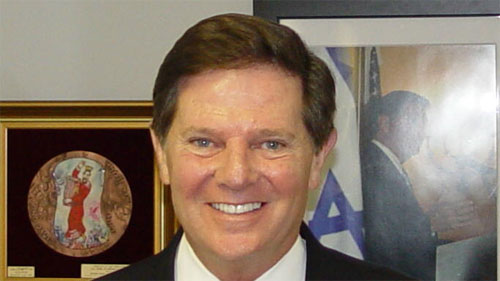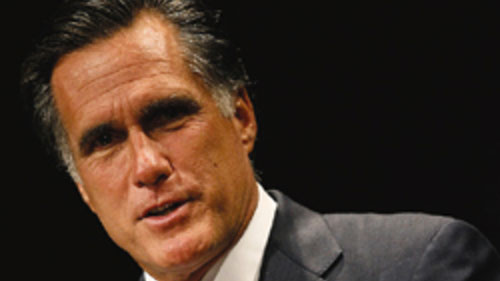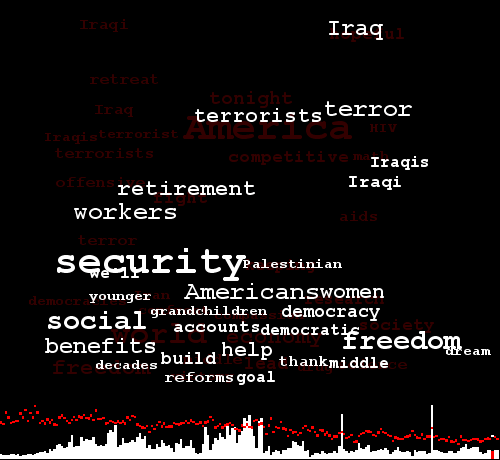Clinton, Edwards, Giuliani, McCain, Obama, Romney. These are the names we can reasonably expect to remain on the presidential ballot in November of 2008. This is what political pundits tell us on television, on the radio, in magazines and in newspapers. This is what we’re told with sixteen months left before we asked as citizens to select our next chief executive. Well, phooey. Personally I like the folks that seem doomed to be remembered as also-rans.
Continue reading
Category Archives: Politics
Candidates vs. English
I didn’t have the chance to watch last night’s Republican presidential debate on CNN, as I have a job, but was able to catch up with it today. Two quotes caught my attention. One of them, courtesy of Mitt Romney, was seized upon by Keith Olbermann and Jon Stewart: “Well, the question is kind of a non sequitur, if you will. And what I mean by that — or a null set — and that is that if you’re saying…” Well, Mr. Romney, that isn’t what a non sequitur is. Maybe he misspoke, but no, he mis-uses the phrase again when challenged for dodging the question: “Well, I answered the question by saying it’s a non sequitur.”
For those of you keeping score at home, “non sequitur” literally means “does not follow.”
Speaking of the literal meanings of things, another quote caught my ear, this time from Mike Huckabee: “And the fact is, they know that if they have excessive taxation and a tax system that literally steps on their head…” Oh my. Our tax system literally steps on our heads? Literally? I was unaware that the tax system had feet, or was capable of stepping on anything.
Clearly the No Child Left Behind program was too late to save these unfortunate souls. People shouldn’t be permitted to throw around high-falutin’ words when they don’t know what they mean. Not without being called on it.
Four Years
Happy mission accomplished day. May all your major combat operations in the coming year be fruitful.
*edit: oh, what terrible irony that Bush should veto a war spending bill today.
State of the Union
I’ve been working on some projects, at the pace my work and family obligations allow, and have found some pretty cool stuff out there. Related to the HTML Grapher I found several months ago, though only tangentially, is State of the Union an interactive index of every State of the Union address from 1790 to present. Key words (excluding particles like “a,” “the,” “in,” and so forth) are tallied laid out relative to the individual speech being viewed and relative to the entire texts of the 217 addresses. Ladies and gentlemen, the state of this index is strong.
panem et circenses

Two things only the people anxiously desire — bread and circuses.
–Juvenal
Superbowl Sunday is upon us again. Millions of Americans that cannot be bothered to pay even slight attention to the activities of their government will passionately cheer for overpaid adults playing a child’s game. They will project loyalty and pride in the performance of these athletes, who nominally represent the cities of Chicago and Indianapolis. Through a complicated web of inflated rivalries, viewers that don’t hail from the midwest will root for or against one team or the other.
Or were you planning to watch it for the ads?
Take that!

Prop 90 seeks to limit the state government’s ability to exert “eminent domain” on private property to benefit other private concerns.
Pipe Dreams

Proposition 89 seeks to clean up politics in California by providing public funds to people seeking office in the state government. Will 2006 be the year we finally figure out how to nip corruption in the bud?
Fifty Bucks

Proposition 88 Is pretty straightforward: a $50.00 parcel tax that goes towards schools.
(+) The children. They’re our future, you know.
(+) It’s $50.00. That’s literally less than a dollar per week per parcel of land. That’s not a very big burden to put on the backs of Californians.
(-) Again, we’re looking at a tax shackled to a spending formula. This tax does nothing for the general fund. Every dollar committed by law to special programs like this gives our legislators more excuse to not do their jobs properly.
(+) Unlike Prop 1D, which is effectively paying $20,300,000,000.00 to get $10,416,000,000.00 today, Prop 88 is pay-as-you-go. Everybody can tell what the tax is going to cost, now, as opposed to wondering what we’re going to have to do tomorrow to balance our budgets.
(+) It gets around Prop 13. This means that people that have had their property taxes more-or-less locked in since the early 1980’s have to pay the same amount as people that bought their houses more recently. Like me.
(-) This is the first time California would have a state-wide property tax like this. Local districts have introduced parcel taxes for years. I should know, I pay enough of them. Actually, that’s exactly the point: I’m already paying several parcel taxes for schools.
Of the state-wide propositions on the ballot next week, this is the one I’m most inclined to give a “yes” to. As a self-interested taxpayer, I’m generally in favor of voting down new taxes, but as a parent and a pragmatist, I recognize that good schools are an excellent investment in the future prosperity of the state. I’d be more comfortable with this if there were some assurance that the state would knuckle-down on some of the rules that force schools to spend money inefficiently (especially in regards to where they can buy books), but I guess that’s too much to ask for.
Tax & Spend
Propositions 86 and 87 are two birds of a feather. The premise is simple: identify an unpopular segment of the population and tax their behavior to fund other, tangentially-related programs.
Continue reading
Parental notification
On the ballot November 7th is Proposition 85, which would require that no minor in the state of California could obtain an abortion until waiting at least 48 hours after her parents or legal guardians are notified. Similar measures have been adopted in other states, pushed forward largely by people that would much rather outlaw the practice entirely, but are willing to settle for any speed bumps they can throw in the path of some body seeking to terminate her pregnancy.
(+) For the purposes of seeking serious medical treatment, our society generally requires parental consent except in emergencies. A child cannot get a tonsillectomy or root canal without the explicit approval of a parent. Abortions certainly fall under this category. The underlying reason for this is a general desire for parents to take responsibility for the children under their care, and to give parents the authority to make decisions regarding the well-being of the child.
(-) There is some serious concern that some minors have cause to fear retribution from their parents upon notification. Such minors would be able, under Prop 85, to petition the juvenile court system for a waiver. This basically means that the minor can still get the abortion without telling her parents, but only after jumping through some hoops.
This proposition strikes me as blatant pandering to a certain segment of highly-motivated voters, and a wedge that local politicians can use in an attempt to differentiate themselves from their opponents, not as any serious attempt to assert parental rights or to protect young girls and unborn children. A quick look at the arguments for and against in the voter guide shows the shrill unthinking tone of the debate around this issue. Note how many phrases uses are either in all-caps, italicized, or both. If either side on this issue had a reasonable case to appeal to their opponents’ better judgment, that wouldn’t be necessary. This Proposition is bullshit, pure and simple, and reflects a disdain for the general public. Its proponents aren’t trying to save unborn children or protect parents, they just want to be seen as seeking to.
Disinclined to encourage such political tactics, Proposition 85 will be getting an easy “no” vote from me; it helps nobody, hurts a few high-risk youths, and places yet another potential burden on our juvenile court system.


